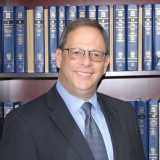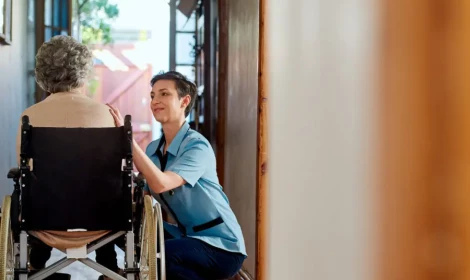Why Get Advice From An Elder Law Attorney (with transcript)
MITCHELL I. KITROSER is the founding managing attorney of Kitroser and Associates, a south Florida law firm focusing on elder law, estate and trust administration and litigation, guardianship and Medicaid planning. He is AV rated by Martindale Hubbell, the highest possible rating for an attorney.

MITCHELL I. KITROSER is the founding managing attorney of Kitroser and Associates, a south Florida law firm focusing on elder law, estate and trust administration and litigation, guardianship and Medicaid planning. He is AV rated by Martindale Hubbell, the highest possible rating for an attorney.
Transcript:
Frank Samson: Well, welcome to Boomers Today. I was about to say Aging Boomers. That was the name of our show but it's now called Boomers Today, and I want to thank everybody for joining us. I'm Frank Sampson, and of course each week we bring you important, useful information on issues facing baby boomers, their parents, and other loved ones. And of course, we have another great show and the reason we have great shows is we have great guests. And our guest today is Mitchell Kitroser, who is the founding managing attorney of Kitroser and Associates, a south Florida law firm focusing on elder law, estate and trust administration and litigation, guardianship and Medicaid planning. He is AV rated by Martindale-Hubbell, the highest possible rating for an attorney. So Mitchell, I want to thank you so much for joining us on Boomers Today.
Mitchell K.: It's my pleasure to be on here, on your show.
Frank: There's so much to talk about as it relates to elder law and a lot of different subject matters, so we're going to try to get going here but I just wanted to start off with a general question, because I think it would be quite interesting for people to understand more about elder law and what an elder law attorney does. An elder law attorney does a lot of things, I'm aware of that, but maybe you could give, just a kind of overall explanation or definition of elder law and what you do day to day.
Mitchell: Sure, I'm happy to do that. And different elder law attorneys will do different things. So, for your listeners, if they feel like they want to talk to an elder law attorney and they look in let's say Google for elder law attorneys, they might find attorneys that focus primarily upon Medicaid planning. Getting people disability benefits. Special needs planning for children with special needs. They might find an attorney with a broader practice more like mine, where we also in addition to doing those things, we focus our practice on guardianship, and estate planning, and asset planning for seniors and long-term planning for children with special needs.
And it will depend. Elder law is a pretty broad term and different lawyers define it differently, and different practices narrow it in different ways. But for the most part, when you're looking at an elder law firm, you're looking at a firm that addresses their clients' needs through the lens of dealing with people who maybe need a little extra protection, a little extra care. People who are not always fully cognizant and may need some help with protection.
Frank: Got it. So, when you mention estate planning, I'm sure everybody listening to this has heard that term. But what is that, what does that mean, estate planning? You give us some examples of that.
Mitchell: Well, we all think that we need a will and people come to my office all the time and they tell me, "I need a will, I want to redo my will." What I very rarely hear is, "I want to redo my power of attorney," or, "I want you to look at my health care surrogate document." And ironically to me, those two documents are far more important than a will. Because all a will does is tell the court who to give your stuff to after you're dead. A power of attorney is a document that's going to protect you if you get sick or hurt and can't manage your own financial affairs for a while. And a healthcare surrogate document is going to be the document that appoints somebody to make a medical decision for you in an emergency, if you get in a car accident or you have a sudden illness and you're unconscious in a hospital. And it's not that you're going to die, but somebody's got to step in and authorize surgery or transfer you to a different medical facility. That's what a health care surrogate's going to do.
So, when it comes to doing estate planning, a full package of estate planning documents should include, not only a will but a durable power of attorney, a health care surrogate document, a HIPPA waiver to authorize somebody to speak to your doctors if they need to. Probably a living will. Maybe an irrevocable trust, if you want to do a more sophisticated version of an estate plan. Possibly depending upon your age and your health condition, do not resuscitate might be included in the documents. And then, a good estate planning attorney is also going to sit down and look at your tax issues, although not that many clients these days have tax issues because the threshold for estate taxes is so high.
In addition to that, other types of trusts, depending upon your needs. If you have children with special needs, you might be looking at some special needs trust planning. Irrevocable trusts. If you have beneficiaries that you're looking at who maybe are spendthrifts or not responsible with money, you might be doing a spendthrift trust for them. And then if what the client's coming in to talk about is Medicaid planning, and you have to manipulate assets to get a loved one qualified for Medicaid, and they're married, then the spouse's estate plan needs to be completely retooled because we don't know as lawyers, who's going to die when.
So estate planning is a very broad topic, and for an elder law attorney at least, we're looking at it through that lens. We're looking at it through the lens of, what are the needs of this particular family as they come in. I think that's probably true for any estate planning attorney, even if their focus is not elder law.
Frank: Right. So I have a couple follow up questions for you on that. So, you mentioned power of attorney, which boy I'm glad you mentioned that, and durable power of attorney. In all due respect to your profession, I think it's a lousy name. And the only reason I think it's a lousy name, is I think when people hear power of attorney, they think, "Oh my God, this is going to cost me a fortune, and do I really need to do this, and do I really?" You know. So why don't you explain exactly what a power of attorney is, the difference between that and a durable power of attorney? And I always tell people and I'm not an attorney all right, but I tell people, "If you're 18 years or older, you should have a power of attorney." I'm not sure if you agree with that, but can you talk a little bit more about it and why it's so important? And I'm glad you said, "It's probably even more important than the will," and I agree with you on that. But, why don't you expound upon that.
Mitchell: Sure, and I absolutely agree with you that anybody who's over the age of 18 needs to have a power of attorney. In fact what we tell our clients is, "When your children turn 18, before you send them off to college, before you let them out the door and live in another city or another town, have them come into our office and we will do a power of attorney for them, along with a health care surrogate and a HIPPA waiver. So, if your kid gets hurt while at school or sick while they're at school, you are not shut out of information." Parents don't realize that once their children are 18, their rights under federal law under HIPPA kick in. And even a parent can't find out what's going on with their kid away at school unless they have these waivers and these documents. So, very, very, important to do them, in fact for our clients, we offer them free of charge. That's just a service that we do because I think it's so important.
Frank: And if I may add one thing. It's the same with a spouse. Just because you're married, you still have to have power of attorney.
Mitchell: Absolutely. Certainly, even with a spouse it's important. Health care is a little different with a spouse. Particularly, I'm in Florida and a spouse will be able to make medical decisions in Florida without a health care surrogate document, or a health care power of attorney. But still, it's so much easier and you're talking about documents that are really designed to help in an emergency. The last thing you need in an emergency is to have to argue with somebody over whether you have legal authority. It's so much easier and better to just get the stuff done in advance.
To answer your question about the word durable. So, when we talk about powers of attorney, there's really a couple of different flavors. The durable general power of attorney, which is the overarching power of attorney, is the document that gives somebody else the authority to do for you, pretty much everything you can do for yourself, from a financial point of view. So for example, if I have power of attorney for you, I can sell your car. I can sell your house. I can do your banking, I can pay your bills. I could bring a lawsuit on your behalf if you're hit in an intersection, and you're in a hospital, and you're not capable of making these decisions. I can retain counsel for you. I can deal with the IRS if you have tax issues, and a whole variety of other things. I can deal with your insurance, I can deal with your retirement benefits. That's what a durable power of attorney can do for you. And the word durable simply means that it survives your incapacity. So, if you were to become incapacitated, this power of attorney is still effective. That's where the word durable comes into play on.
There are also limited powers of attorney, and some of your listeners may have used those. For example, if somebody is selling a piece of real estate but going out of town, going away on vacation or, taking a medical trip or something, and won't be there for the closing, they could do a limited power of attorney for a specific purpose, such as signing the closing documents. So, two different types of powers of attorney.
Frank: So sometimes, as we both know, families can wait too long. They have a parent, let's say, who is needing care. There's no power of attorney and they get to the point, maybe with dementia or some form of dementia like Alzheimer's and they go, "Boy, we have to get a power, we better do the power of attorney." Could be too late at that point, am I correct?
Mitchell: You are correct. No responsible attorney is ever going to let somebody who doesn't have capacity to understand the documents sign a legal document. And that becomes really important as people get older. Because one of the powers that you want to put in a power of attorney, and again, when I say that lawyers look at things through their own lens, and elder law attorney's power of attorney might look at little different from an attorney that doesn't do elder law. Because an elder law attorney's power of attorney is going to include somewhere in there, the right to do Medicaid planning. The power and the authority to gift assets and move them around in order to qualify a loved one for Medicaid. And these are pretty powerful powers. These are things that you don't want to give away.
You don't want to see a client give away if they don't really understand what they're doing because in essence, they're authorizing somebody to take the assets that they've worked hard for, and they've saved their entire life for, and put them someplace where they can no longer claim ownership over them. So, no attorney's going to do that unless they're comfortable that the client they're sitting across the table from understands exactly what they're doing.
Frank: That was a great lead-in to my next follow up on Medicaid planning. People get confused with Medicare and Medicaid. Medicare being more I guess, health care insurance for people that have earned it of course, 65 and older in the United States, and then Medicaid, I guess we could spend the whole time just talking about what that is. But, I try to explain it as more, it's almost like long-term care insurance for seniors or can be. But you know, it many times, it's only in health care locations like nursing, etc.
But the perception out there, is that you pretty much have to be out of money in order to get approved with Medicaid, and that's true. So can you talk about, when you talk about Medicaid planning, if somebody does have too much money to get approved, there are legal ways from an estate planning standpoint to set up the estate through trusts, etc. you can get approved. Talk about that a little bit so people understand. I know that's a loaded question, you could probably talk for an hour on it, but I’ll let you give an overview of it.
Mitchell: Okay, well there's a couple, three subtopics there. The first is that Medicaid, you're right, is a needs based program. And again, we call things by similar names but they have nothing really to do with each other. Medicaid is a needs based program, so what the government does is, it says if you're poor and by poor I mean really poor, and you need health care services, Medicaid will be available to help you. But, what your listeners need to know is that each state is, although it's a federal program, it's administered state by state on a state by state basis. And one of the terms people have probably heard over the years is Medicaid expansion. And that's critical, because different states, some states have adopted Medicaid expansion as part of the affordable care act and other states have not. And for example, Florida has not and therefore our Medicaid benefits are fairly limited. A lot of the other states around the country have, and they have more expansive Medicaid benefits.
For anybody who's thinking about Medicaid, you've really got to consult with an attorney in your state who is familiar with the Medicaid rules. I'm going to give you a plug for NAELA at this point. NAELA is N-A-E-L-A and it's naela.org which is a national website. It's the National Association of Elder Law Attorneys, and most good elder law attorneys are members of NAELA. It provides us with resources, and educational services, and the like. If you're looking for a Medicaid or an elder law attorney, that would be one place to stop and take a look, and you'd be able to locate attorneys who are local to you.
When it comes to looking at Medicaid benefits, you really want to get with an attorney in your area, in your state who's familiar with that. Because those are the people who are going to know what's going on. So, to do the planning part of it, there's really two types of planning that I see. There is the clients that come in and say, "I know that at some point down the road, I may have dementia, what do I do?" We don't see too many of those because what happens in those situations is, I'm typically telling them that they have to start to move assets out of their control, and nobody really wants to do that when they're fine. The more common situation that I get is, "My spouse has just fallen and broken a hip or has dementia and I can't take care of them at home anymore, they need to go into a nursing home. I haven't done any kind of planning. Do I need to spend down my assets in order to get them qualified for Medicaid so that we don't go broke paying for the nursing home?"
And the answer to that is no. In both of those cases, the answer to that is no. You can plan in advance. Your listeners have probably heard of the phrase, the look back period. Well the look back period used to be three years. And what the look back period means is simply, you can't give away your assets within a period of time and then qualify for Medicaid. So, for an example, mom has a million dollars, needs nursing home care, has dementia. Daughter has power of attorney. Went to an elder law attorney so has a power of attorney that gives her the right to give away mom's assets, even to gift them to herself. And daughter takes mom's million dollars and then gifts it to herself and then applies for Medicaid and says, "See, mom is poor. She has no assets." Well, obviously that's not going to work. That's going to trigger a violation of the look back period. But, had we done that five years before mom needed nursing home care, it would be fine. That's the five year look back period and that's how that works.
More often though, what I see is that people come in at the last minute and they say, "Well, what do I do now? Mom has fallen, she needs nursing home care. She has a million dollars. Do I need to spend all off that money down before I qualify her for Medicaid?" And the answer still is no. There are techniques that can be used, depending upon what state mom lives in that can preserve some or all of those assets and use them still for mom's benefit but allow her still to receive Medicaid benefits somewhere along the way, so that she doesn't exhaust all of her money. Because what happens is, when you're on Medicaid, you only get a certain amount of money each month. The rest of it goes to the nursing home. The taxpayers make up the difference.
And Medicaid only pays for the facility. It only pays for a semi-private room, the care, and the food. Anything else that mom might need, new clothes, eyeglasses, maybe a cell phone. Perhaps she wants to go take a trip to go see a grandchild get married, or a great-grandchild have a baby naming, none of that stuff is ever going to be paid for by Medicaid. So if you can take some of mom's money and you can sequester it in a place where it will not disqualify her for Medicaid benefits and use it to enhance her life for the rest of her life, I consider that a good thing. Now ultimately, the state's going to get repaid for everything that they spent for mom during her lifetime. But still, Medicaid planning helps to enhance a client's lifetime and to enhance the quality of their life, even where they're in a nursing home.
Frank: You did a great job in explaining a very complicated subject matter, so thank you for that. And I do want to talk to you more about protecting seniors against exploitation, which is a big problem. It’s just a horrible problem everywhere, and that's seniors being taken advantage of. Sometimes we refer to it as abuse, you know there's physical abuse. Sometimes when people hear abuse, they think of physical abuse, but it could be financial abuse, just taking advantage. You've referred to what I think is a great term, just exploitation. Talk to us just how big of a problem this is, and what's being done, and any advice that you can give to our listeners to help protect seniors against it.
Mitchell: Exploitation at least from my practice, is an enormous problem. We see a lot of it. We see it in our guardianship practice and it typically takes one of three or four different versions. And the patterns repeat themselves time after time. There's the stranger who comes into somebody's life and befriends an older person. Maybe they're lonely, maybe they're vulnerable, maybe they've lost a spouse years ago and their kids live elsewhere, and suddenly this person is paying their bills and then says, "Well, it would be so much easier if I just had power or attorney so that I would have easier access to your accounts." And then money gets, you know money is disappearing. Unfortunately there are other forms as well that we see a lot of.
One is children. Children come in and occasionally, you see a family where there's just one child who remained financial dependent on parents through their lifetime. And now when the parent is fine and they want to help their kid out, nobody really has a problem with that. But when the line starts to get crossed and when the parent starts to becomes less cognitively aware and less able to make their own decisions and less vulnerable to what we call undue influence. That a word we lawyers use for it. That's the point at which it's no longer okay, and we see a lot of that where children are just pushing parents. "Hey, mom. Hey, dad. You've always helped me out. I need another $100,000. And of course then, the other children find out, and there's a family war.
Another situation, another scenario we see a lot of is a second spouse and children by first marriage. Even if you went out and you got yourself a prenuptial agreement when you got married the second time or the third time, a prenup only protects you if you maintain your assets in a separate account. And what we typically see in these situations, is that the second spouse works on the spouse, and starts to encourage them to move assets from their separate account into a joint account, or into the spouse's account. And little by little money starts to move from one parent, from one spouse to the other spouse. And again, the children find out and there's a whole war.
So planning would be a really good thing. The problem is that, when I do planning for people to prevent exploitation, the person that I have to protect my client against is themselves. And that's very hard to do. Nobody, at least nobody has walked into my office, is really all that comfortable with taking their assets and turning control of them over to somebody else. But unless you do that, unless you're prepared to do that, you're vulnerable later on in life. Take for example, this 75 year old man who's lost his wife, and he's home and maybe he did well in life and he's got seven, eight million dollars to his name, and he comes in my office and is interested in remaining autonomous, but also needs a plan for his finances so as not to become susceptible to abuse.
He would be somebody who would need a plan. And he may not like the plan I'm going to propose, but I'm going to propose to him that he take the majority of his assets, if he's worth seven million dollars, maybe six of it, and place it in an irrevocable trust with a professional trustee to manage his assets for him. The professional trustee can pay him income, and the professional trustee can also dispense principal to him as he needs it. He'll still have his own account, he'll still have the ability to do what he wants with the money that he keeps in his own account. But the rest of the money won't be vulnerable to exploitation. Nobody will be able to take it from him. Not his new companion, not a stranger, not even his children, all of whom are potential exploiters in any scenario.
And it's a hard discussion to have with a client, and it's a hard thing for a client to do because they don't want to give up control. But you can see where that's where the vulnerability is. This is a person who will be vulnerable at some point in their lives. And those are the folks that I end up doing guardianship cases on, and guardianship gets to be expensive, and time consuming, and heartbreaking. So, to the extent that we can protect somebody's assets, we can also protect them from exploitation. If we're protecting them from exploitation, we're probably keeping them out of guardianship court.
Frank: Those are tough situations to deal with, I'm sure. But thanks for discussing that. Well, I could talk to you for quite a bit longer but we're kind of getting out of time here. But if you would, if you could take the time to let everybody know how they could get ahold of you. Either a website, number, whatever you want to share. And also, if you wouldn't mind mentioning NAELA again, in case, I know you're in Florida but if somebody's in another part of the country and is looking for an elder law attorney, maybe you could bring up that website again. So go ahead and share your information.
Mitchell: Sure. So the website to go to is naela.org. N-A-E-L-A.org and that's anywhere in the country. And then once you're on the site, you can give your location and it will provide you with local elder law attorneys close to you. If you're in south Florida and you're looking for an elder law attorney, there's several of us down here. A lot of us who are very, very good. My name is Mitchell Kitroser and my website is www.kitroserlaw K-I-T-R-O-S-E-R-L-A-W.com. And I'm fortunate in that my name is fairly unique, so if you were to type in Google, Mitchell Kitroser, I think I'm the only one you're going to get.
Frank: Mitchell Kitroser, kitroser.com. It's kitroserlaw.com I should say, so Mitchell, thank you so much for joining us on the Aging Boomers, and thank you everybody for joining in, and just be safe out there, and we'll talk to you all soon.
Mitchell: Thank you, Frank. Have a good day.
Frank: Thank you.





